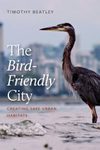"We get a fresh, different perspective on the distressed Victorian city where official attitudes to animal ownership reflected political, religious and class divisions."
– Irish Times
"Adelman's approach is imaginative, well-paced, and accessible. The reader is not confronted with a heavy tome, but an impressive body of research skilfully crafted into a compelling narrative."
– Dublin Inquirer
"Adelman presents Dublin's growth and structural changes in a new light: in her lively, highly readable written account, she shows how human-animal relations changed in direct relation to class distinctions, economic inequalities and religious beliefs."
– Social History of Medicine
"Evocative and compellingly argued, this book brings a highly charged period of Dublin's history to life with sensitivity and purpose. Adelman sheds new light on a fascinating city through the complex human-animal relationships that shaped it."
– Thomas Almeroth-Williams, author of City of Beasts: How Animals Shaped Georgian London
"In James Joyce's imagined Dublin, readers encounter pumas and alligators, camels and whales. But the animals that populated every street in the real Dublin of Joyce's childhood were less exotic – dogs and pigs, horses and cattle, and vast numbers of them. Their history has never been told until now and it is something of a revelation: Juliana Adelman's remarkable study of everyday animals in the development of the Irish capital provides an entirely fresh perspective on the troubled history of the Victorian city, riven as it was by political, religious and class divisions. Public and official attitudes towards animal ownership and animal welfare reflected these tensions, and different animals were credited with very distinctive cultural meaning. From the Dublin Zoo to the first dog shows, from the dingy piggeries to the new-style dairies, Adelman opens up a new debate on animal-human relations and thereby reconceptualises the old debate on the modernisation of Irish society."
– David Dickson, Professor of Modern History, Trinity College Dublin
"Juliana Adelman brilliantly re-imagines the social and commercial geographies of nineteenth-century Dublin as alive with the rumbustious sights, smells and sounds of its exploited animal life. Middle-class "improvers" mobilised on the understanding that the city could only become "civilised" if new regulatory regimes expunged this animal presence, reforming the incorrigible ruralism of its lower-class inhabitants along the way. This is the fascinating story Civilised by Beasts sets out to tell."
– Matthew Kelly, Professor of Modern History, Northumbria University
"A brilliant and ground-breaking study of shifting relationships between animal and human, rural and urban, nature and culture in nineteenth-century Dublin. Civilised by beasts retrieves the exotic animals in the Zoological Gardens, the horses pulling carriages on the city streets and the pigs in backyards. Detailed, engaging and lucid, it is invaluable for a historical understanding of the environmental, social and political tensions of nineteenth-century Dublin and Ireland. More broadly, this book is an important contribution to the fields of social and environmental history, urban studies and Irish Studies. A fascinating and highly readable account of a neglected aspect of Dublin's social history."
– Helen O'Connell, Associate Professor of English Studies, Durham University



































